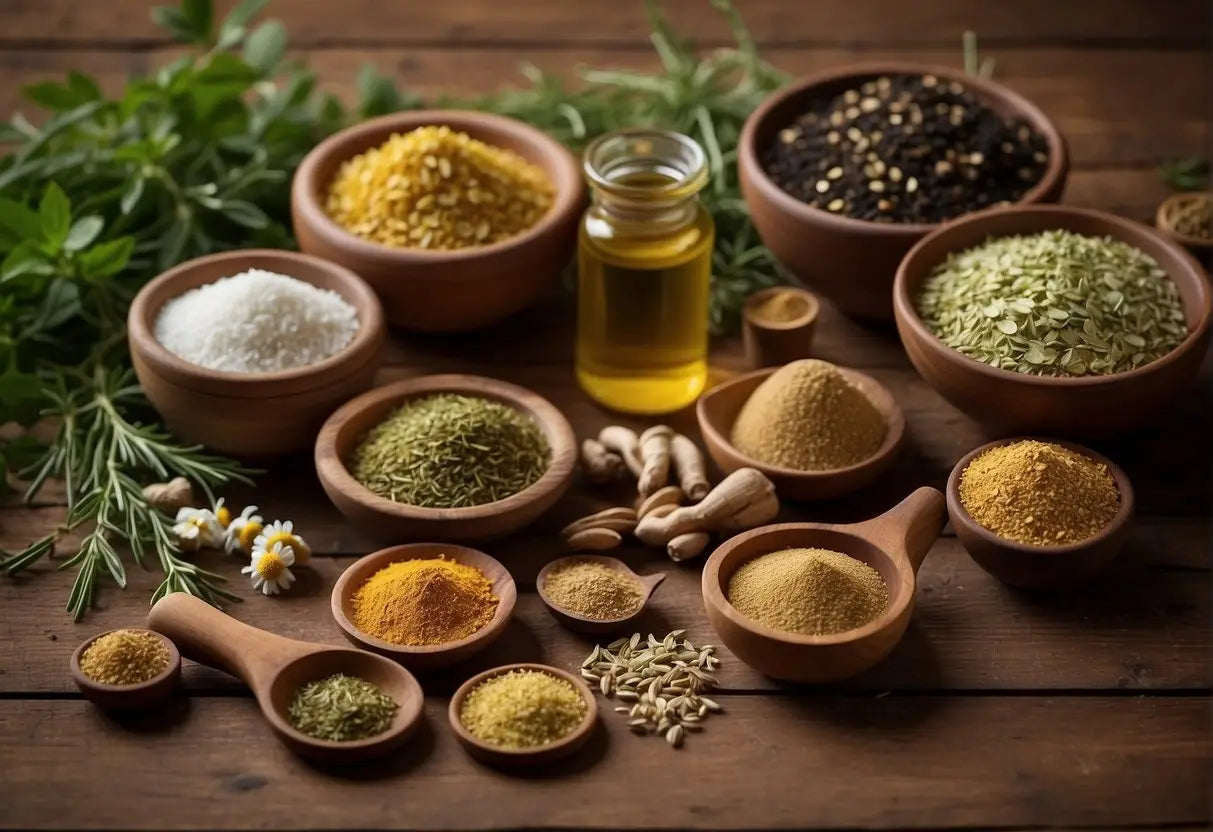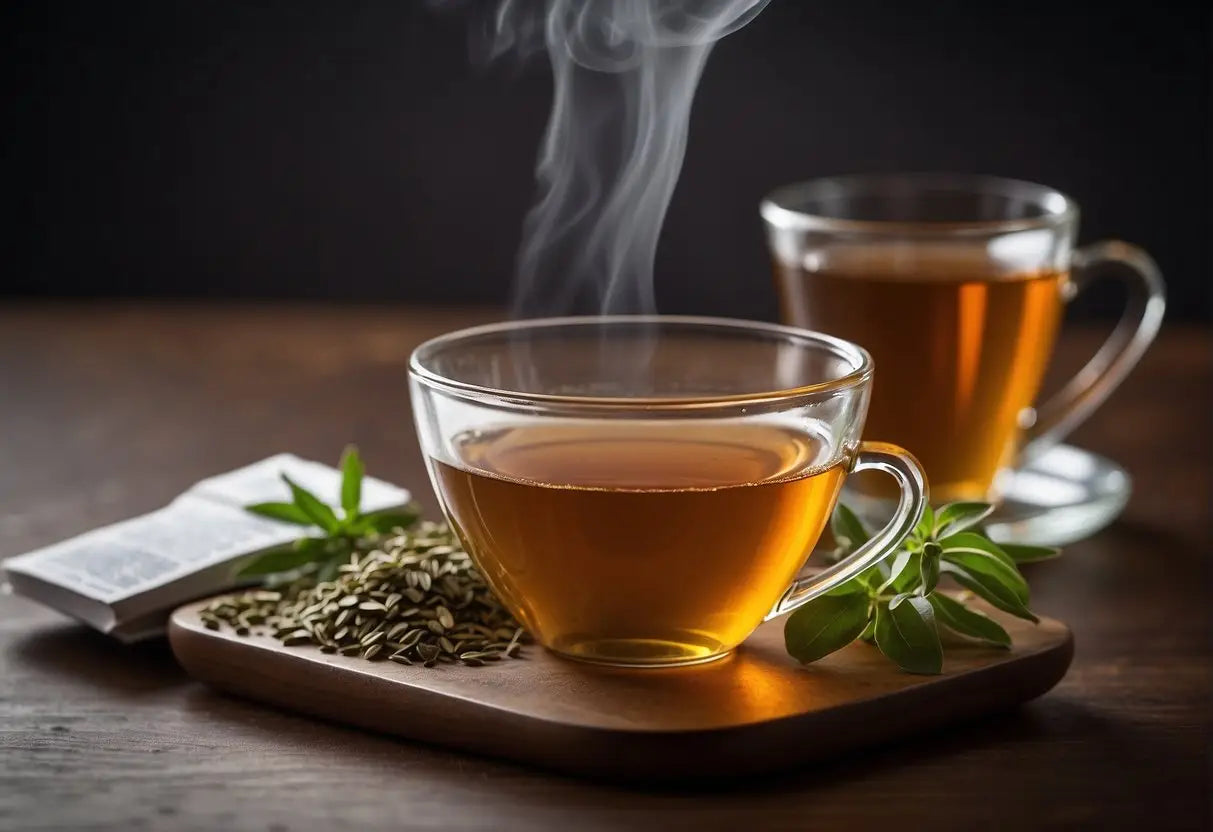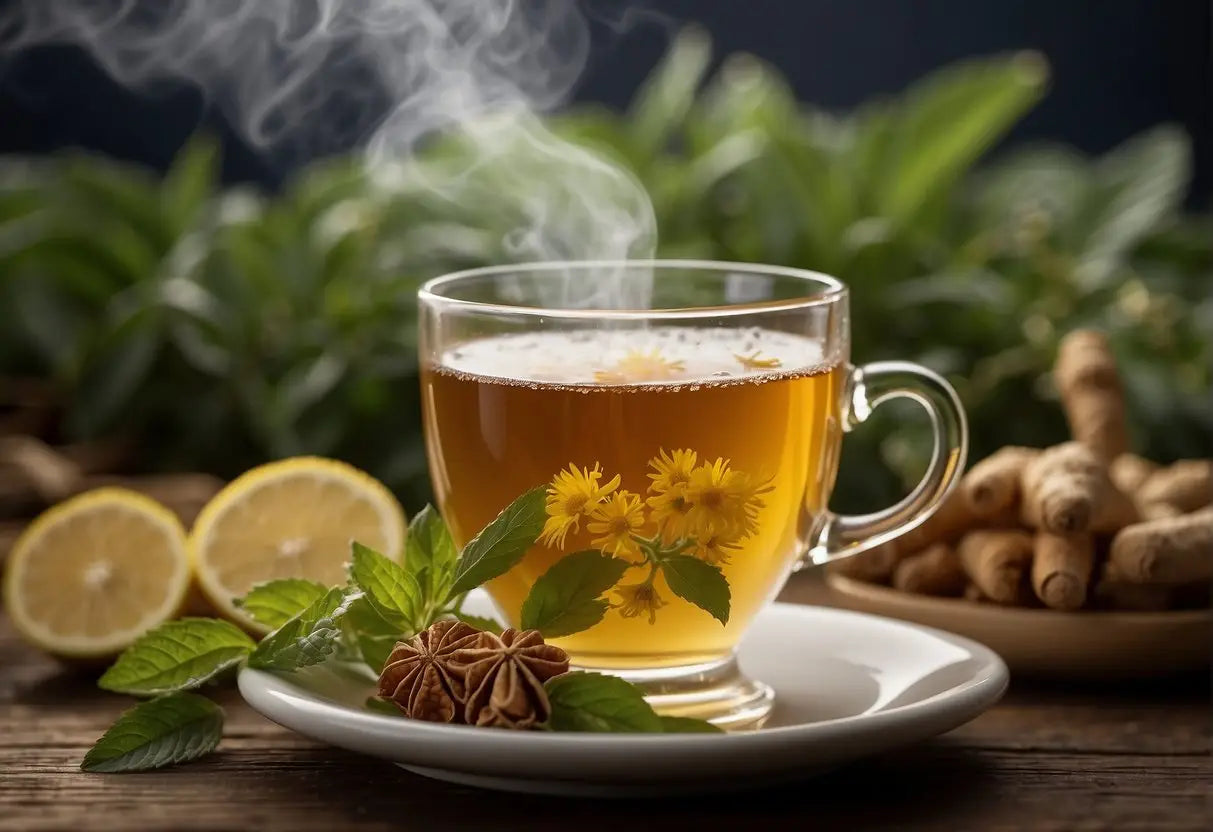What Tea is Good for Stomach Pain
Types of Tea for Stomach Pain
Ginger Tea: Often sought for its soothing effect, ginger tea can help reduce nausea and ease stomach discomfort. Zingiber officinale, the active ingredient, has properties that may help with digestion and alleviate pain.
Peppermint Tea: Peppermint leaves contain menthol, which is a natural antispasmodic, meaning it can relax the muscles of the digestive tract. This tea is typically recommended for symptoms like bloating and indigestion.
Chamomile Tea: Known for its calming properties, chamomile tea is associated with relieving gastrointestinal issues. It may help you relax, reduce stress-related stomach pain, and can also aid in reducing inflammation.
Bestsellers
Fennel Tea: Fennel has a reputation for treating various digestive ailments. Drinking fennel tea might help ease cramping and reduce bloating thanks to its antispasmodic qualities.
Licorice Root Tea: This tea has a sweet taste and is linked to soothing gastrointestinal problems. Glycyrrhizin, the primary compound of licorice root, can support stomach lining and ease discomfort. However, it should be consumed in moderation.
Preparation Tips
- Brew fresh, when possible
- Opt for organic teas to avoid additives
- Steep according to individual tea recommendations
- Start with weaker brews to gauge your body's reaction
| Tea Type | Active Component | Potential Benefits |
|---|---|---|
| Ginger Tea | Zingiber officinale | Nausea relief, digestion aid |
| Peppermint Tea | Menthol | Antispasmodic, indigestion relief |
| Chamomile Tea | - | Stress relief, anti-inflammatory |
| Fennel Tea | - | Reduces cramps, bloating |
| Licorice Root Tea | Glycyrrhizin | Supports stomach lining |
Remember to consult with a healthcare professional if your stomach pain persists or worsens.
Herbal Teas and Digestion

Numerous herbal teas have been recognized for their digestive benefits. They can help alleviate stomach pain and promote digestion.
Peppermint Tea Benefits
Peppermint tea is a popular choice for soothing the digestive tract. The active ingredient, menthol, relaxes the digestive muscles, which can reduce cramps and spasms. Regular consumption may help manage symptoms like bloating and gas.
- Relieves: Discomfort, Bloating
- Promotes: Muscle relaxation in the gut
Ginger Tea Advantages
Ginger tea contains compounds like gingerols and shogaols which have anti-inflammatory properties. These can aid digestion and potentially lessen nausea.
- Anti-inflammatory: Helps reduce digestive inflammation.
- Nausea Relief: Effective against upset stomach and morning sickness.
Chamomile Tea Effects
Chamomile tea is known for its calming effects, which extend to the gastrointestinal system. It can help mitigate stomach aches by reducing acidity and easing muscle tension within the digestive tract.
- Acid Reduction: Alleviates symptoms of heartburn.
- Muscle Relaxation: Calms the smooth muscles of the gut.
Fennel Tea Properties
Fennel tea has a reputation for assisting with a variety of digestive ailments. Its compounds, such as anethole, have carminative effects which means it may help in expelling gas and reducing bloating.
- Gas Relief: Helps to expel excess gas.
- Digestion Aid: Encourages overall gut health.
Green Tea and Stomach Pain
When you're experiencing stomach pain, green tea can be a soothing beverage to consider. Its potential benefits for digestive health stem from its anti-inflammatory properties and antioxidant content, mainly due to the presence of polyphenols like catechins.
The active compounds in green tea may help reduce inflammation in the gastrointestinal tract, which can alleviate pain. However, it is crucial to note that green tea also contains caffeine, which can irritate the stomach lining for some individuals. If you are sensitive to caffeine, opt for decaffeinated versions to enjoy the benefits without the irritation.
Ginger-infused green tea is another variant you might find beneficial. Ginger has been recognized for its gastroprotective effects, which can work in tandem with the positive aspects of green tea.
Lao Ban Zhang
| Component | Benefit |
|---|---|
| Polyphenols | Antioxidant; helps reduce inflammation. |
| Caffeine | Can stimulate digestion; may cause irritation. |
| Ginger | May soothe the stomach and reduce nausea. |
- Brew green tea using water that's just short of boiling to avoid releasing too many tannins, which can upset the stomach.
- Steep for a shorter time (1-2 minutes) to keep the caffeine content low.
- Consider adding a slice of ginger to your tea to enhance its soothing effects.
Remember to drink green tea in moderation and consult with a healthcare professional if your stomach pain persists or if you have any concerns about incorporating green tea into your diet for this purpose.
Preparation Techniques for Soothing Teas

When seeking relief from stomach pain, the preparation of your tea is as crucial as the type of tea you choose. Here are simple techniques you can follow to brew teas that may help soothe your stomach:
Selecting the Tea:
- Ginger Tea: Grate fresh ginger. Use 1 teaspoon of fresh ginger per cup of boiling water.
- Peppermint Tea: Use fresh or dried peppermint leaves. About 1 tablespoon fresh or 1 teaspoon dried for one cup.
- Chamomile Tea: Add 1 tablespoon of chamomile flowers to a cup of boiling water, or use a chamomile tea bag.
Water Temperature:
- Boil water, but let it cool for a minute before pouring to avoid scalding the delicate herbs, preserving their soothing properties.
Steeping Time:
- For ginger tea, steep for 5 to 10 minutes.
- Peppermint tea should steep for 7 to 12 minutes.
- Chamomile tea needs about 5 minutes.
Straining:
- Strain ginger tea to remove the bits of ginger.
- Use a fine mesh strainer for loose leaves or flowers.
Additional Tips:
- Avoid over-steeping as it may lead to bitter flavors.
- Optional: Add honey or lemon to taste, but do not use sugar as it can worsen stomach discomfort.
Remember, the key is gentle brewing to maintain the calming effects of the herbs. Enjoy your tea warm, and sip it slowly for maximum benefits.
Dosage and Consumption Recommendations

When considering herbal teas for stomach pain, it's vital to follow proper dosages to maximize benefits and minimize any potential side effects. Below are recommendations for common teas that may ease stomach discomfort:
-
Ginger Tea:
Start with 1–2 cups per day. Use about 1/2 teaspoon of grated fresh ginger per cup of hot water. Steep for 10 minutes before drinking. -
Peppermint Tea:
Limit yourself to 2–3 cups per day. Steep 1 teaspoon of dried peppermint leaves in a cup of boiling water for 7–10 minutes. -
Chamomile Tea:
Drink 1–2 cups per day. Brew by adding 1 tablespoon of chamomile flowers to a cup of boiling water and let steep for 5 minutes. -
Fennel Tea:
Consume no more than 2 cups per day. Use 1–2 teaspoons of crushed fennel seeds per cup of hot water. Steep for 10 minutes.
Keep in mind that tea should be taken between meals to avoid impairing digestion. Note the following:
-
Temperature:
Consume teas warm, not too hot or iced, to avoid exacerbating stomach pain. -
Duration:
For acute stomach pain, it's recommended to drink the tea shortly before or after the onset of symptoms. For chronic issues, maintain a consistent daily intake.
Always consult your healthcare provider, particularly if you have existing health conditions or are pregnant, before starting any herbal remedy. If symptoms persist, seek professional advice.
Potential Side Effects of Teas

When you choose tea for stomach pain relief, it's important to be aware of potential side effects. While tea is often seen as a comforting beverage, not all teas are suitable for everyone, and some can cause adverse reactions, especially when consumed in large quantities.
Caffeinated Teas:
- Insomnia
- Nervousness
- Increased heart rate
These symptoms are due to caffeine, which is present in black, green, and oolong teas. If you're sensitive to caffeine, you may experience these effects even in small doses.
Herbal Teas:
- Allergic Reactions
- Interaction with Medications
Herbal teas like chamomile or peppermint are generally safe, but they can interact with certain medications and may cause allergic reactions in susceptible individuals.
Acidic Teas:
- Increased stomach acidity
- Gastrointestinal discomfort
Lemon or berry-infused teas can aggravate pre-existing conditions like acid reflux or gastritis due to their acidic nature.
Tannins in Tea:
- Nausea
- Constipation
Teas high in tannins, such as black and green teas, may cause stomach upset or constipation in some people.
To minimize these potential side effects, monitor your body's response to different types of tea and adjust your consumption accordingly. If you're unsure about the effects of a particular tea, consult with a healthcare professional.
Interactions with Medications
When you're experiencing stomach pain, certain teas might offer relief. However, it's crucial to be aware of how these teas could interact with any medications you're taking. Be sure to consult your healthcare provider before combining teas with medication.
Herbal Teas:
- Chamomile Tea: May amplify the effects of anticoagulant drugs, such as warfarin.
- Peppermint Tea: Could interfere with medications metabolized by the liver, such as cyclosporine.
- Ginger Tea: Potentially increases the risk of bleeding if taken with blood thinners.
Black and Green Teas:
- Contain caffeine which can interact with stimulant drugs and certain antidepressants, possibly raising blood pressure or heart rate.
Licorice Tea:
- Could affect the metabolism of certain drugs due to its glycyrrhizin content.
| Tea Type | Potential Interaction | Medication Type |
|---|---|---|
| Chamomile | Increased bleeding risk | Anticoagulants |
| Peppermint | Alters drug metabolism | Liver-metabolized drugs |
| Ginger | Increased bleeding risk | Blood thinners |
| Black/Green | Affects stimulants | Stimulants, Antidepressants |
| Licorice | Alters drug metabolism | Various |
Remember, this is not an exhaustive list, and interactions can be complex. It is essential to seek professional advice for your specific situation. Regularly consuming teas might necessitate adjustments to your medication dosages, so keep your healthcare provider informed about your tea intake.
Frequently Asked Questions

In this section, you'll find targeted information about how certain teas can help alleviate stomach issues, ranging from general aches to specific symptoms like inflammation and nausea.
Which teas are most effective at relieving a stomach ache?
Ginger tea and peppermint tea are widely recognized for their ability to ease stomach pain. Ginger helps with digestion and can relieve nausea, while peppermint relaxes the digestive tract muscles, which can alleviate pain.
Can chamomile tea soothe an upset stomach?
Yes, chamomile tea is known for its calming properties that can help soothe an upset stomach. It can also help reduce cramping and inflammation, promoting relaxation of the digestive muscles.
Are there teas that specifically help with stomach inflammation?
Turmeric tea, with its main component curcumin, has potent anti-inflammatory properties. Licorice tea may also help by coating the stomach lining and reducing inflammation.
How does peppermint tea provide relief for stomach pain?
Peppermint tea contains menthol, which is an antispasmodic that can help relax the muscles of the digestive tract, thus relieving spasms and reducing pain associated with stomach aches and indigestion.
In the case of nausea or an upset stomach, what teas are recommended?
Ginger tea is one of the most recommended for nausea as it possesses properties that can settle the stomach. A mild tea like chamomile can also be effective for general upset stomachs by providing a soothing effect.
What's the best course of action to alleviate symptoms of bloating and discomfort?
To help relieve bloating and discomfort, consider drinking teas that have carminative effects, such as peppermint, fennel, or anise tea. These teas can aid in releasing trapped gas and reducing bloating.
← Older post Newer post →











